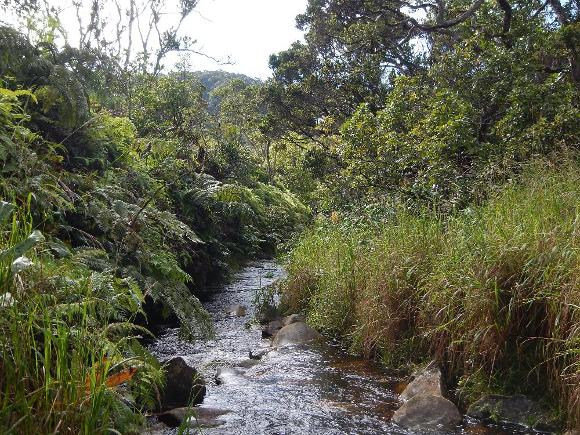Impacts of extreme events on the native and nonnative aquatic species of Hawaiʻi stream ecosystems
Freshwater is a critical driver for island ecosystems. Climate change has fundamentally altered the water cycle in tropical islands. The changes in dynamic patterns of streamflow could result in the temporal and spatial difference in the riverine, estuarine, and coastal habitats that support native species. In particular, these habitats support the nine native aquatic species in Hawaiʻi at different stages of their migratory life cycle. To examine how changes in streamflow regimes have impacted habitat quality for these native aquatic species, an ongoing project has examined statewide long-term stream records.

Researchers are in the process of building hydrological models and connecting the stream dynamics with existing biological data to address the climate impact on stream habitats. In this study, we will examine the historical daily flow and rainfall records to describe the hydrological patterns of stream habitats in Hawai’i. Then, the team will evaluate species traits, including the swimming performance of various native and nonnative species in order to better predict the effect of extreme high flow events on these populations in various stream reaches. With a similar concept, this project will connect with like-minded researchers in Puerto Rico to explore and develop a comparative study to address the changing aquatic ecosystems due to extreme events.
This research project has arisen explicitly from existing research and discussions with local stakeholders (e.g., Commission on Water Resource Management, Hawaiʻi Fish Habitat Partnership, National Fish Habitat Partnership, Pacific Island Fisheries and Wildlife Services) and researchers from different regions. The goal of this study is to provide more detailed information on the impacts of extreme events to better support managers in their decision.
PROJECT DETAILS
FUNDED:
FY2020
PI:
Yinphan Tsang
Associate Professor of Natural Resources and Environmental Management, UH Mānoa
Co-PIs:
Yu-Fen Huang
Department of Natural Resources and Environmental Management, UH Mānoa
Leigh Engel
Department of Natural Resources and Environmental Management, UH Mānoa
Co-Is:
Abigail Lynch
Climate Adaptation Science Centers
Timothy Grabowski
Hawaiʻi Cooperative Fishery Research Unit

